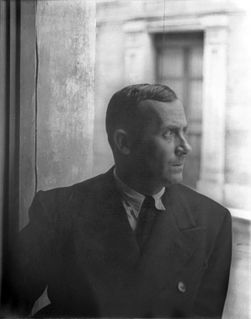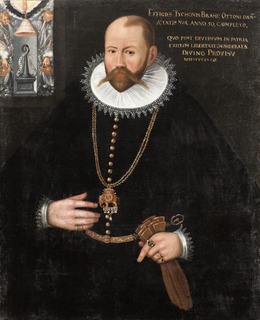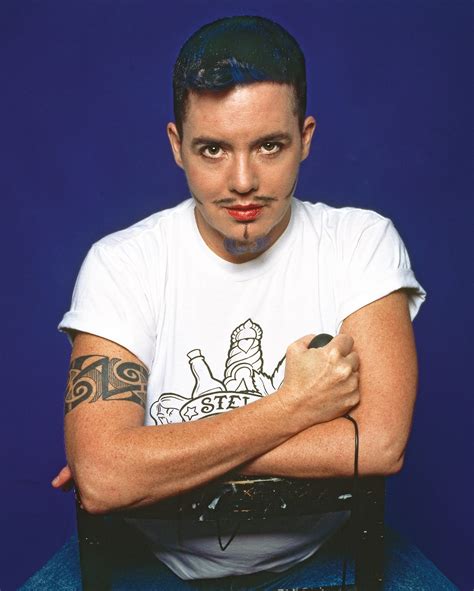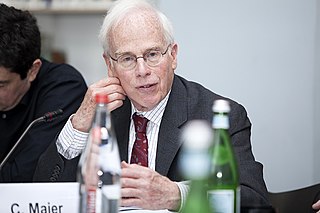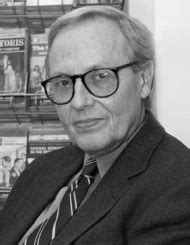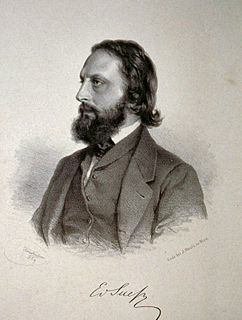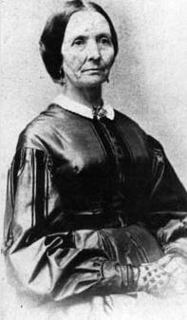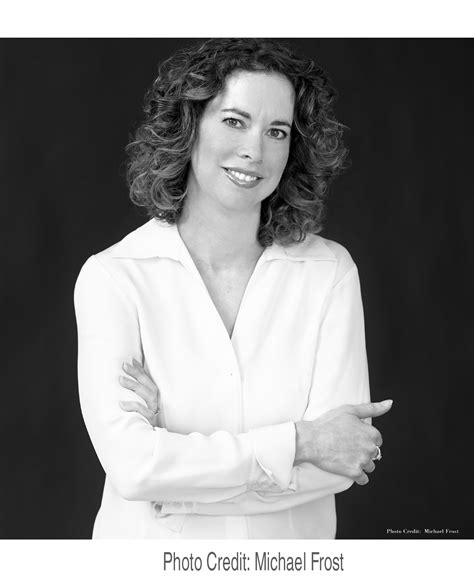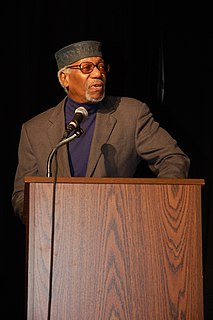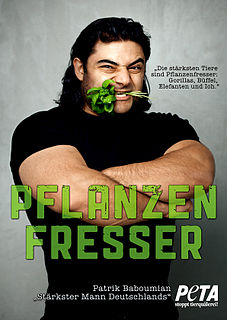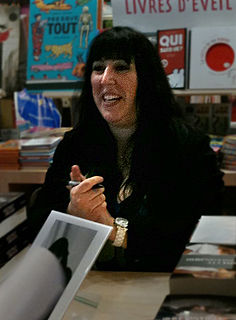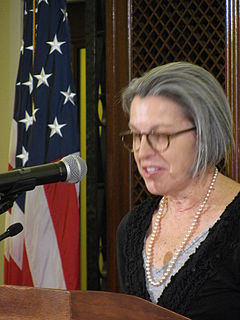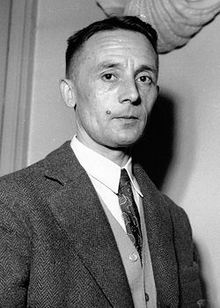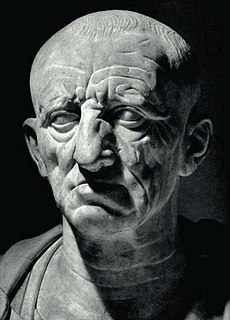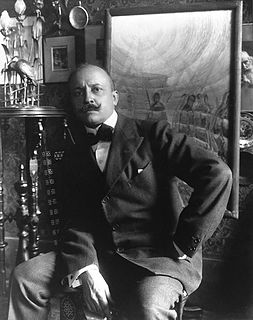Top 237 Traces Quotes & Sayings - Page 4
Explore popular Traces quotes.
Last updated on November 13, 2024.
The stains could be seen only in the sunlight, so Ruth was never really aware of them until later, when she would stop at an outdoor cafe for a cup of coffee, and look down at her skirt and see the dark traces of spilled vodka or whiskey. The alcohol had the effect of making the black cloth blacker. This amused her; she had noted in her journal: 'booze affects material as it does people'.
1) Différance is the systematic play of differences, of the traces of differences, of the spacing by means of which elements are related to each other. This spacing is the simultaneously active and passive (the a of différance indicates this indecision as concerns activity and passivity, that which cannot be governed by or distributed between the terms of this opposition) production of the intervals without which the "full" terms would not signify, would not function.
Love animals: God has given them the rudiments of thought and joy untroubled. Do not trouble their joy, don't harrass them, don't deprive them of their happiness, don't work against God's intent. Man, do not pride yourself on superiority to animals; they are without sin, and you, with your greatness, defile the earth by your appearance on it, and leave the traces of your foulness after you - alas, it is true of almost every one of us!
The advance of science is not comparable to the changes of a city, where old edifices are pitilessly torn down to give place to new, but to the continuous evolution of zoologic types which develop ceaselessly and end by becoming unrecognisable to the common sight, but where an expert eye finds always traces of the prior work of the centuries past. One must not think then that the old-fashioned theories have been sterile and vain.
Never, never do I set to work on a canvas in the state it comes in from the shop. I provoke accidents - a form, a splotch of color. Any accident is good enough. I let the matiere decide. Then I prepare a ground by, for example, wiping my brushes on the canvas. Letting fall some drops of turpentine on it would do just as well. If I want to make a drawing I crumple the sheet of paper or I wet it; the flowing water traces a line and this line may suggest what is to come next.
Because the region of the Celestial World is of so great and such incredible magnitude as aforesaid, and since in what has gone before it was at least generally demonstrated that this comet continued within the limits of the space of the Aether, it seems that the complete explanation of the whole matter is not given unless we are also informed within narrower limits in what part of the widest Aether, and next to which orbs of the Planets [the comet] traces its path, and by what course it accomplishes this.
There is nothing “still” in the remarkably visceral poems of Alexander Long's third collection, Still Life, and nothing is at rest in these restless and edgy poems. Conversational and kinetic, these poems chart the traces left by the shifting overlays of the templates of literature, rock-and-roll, and contemporary culture. As each poem in Still Life attempts to fix a focus upon a scene or subject, the protean natures under view draw the poet into the eddies and complexities of reflection. This is a powerful and moving collection of poems.
That at the same time of this very intimate act of concentrating so carefully on the details of our mother's palm and fingertips, he was also removing all traces of any tiny leftover parts, and suddenly a ritual which I'd always found incestuous and gross seemed to me more like a desperate act on Joseph's part to get out, to leave, to extract every little last remnant and bring it into open air.
The aspect of the venerable mansion has always affected me like a human countenance, bearing the traces not merely of outward storm and sunshine, but expressive also, of the long lapse of mortal life, and accompanying vicissitudes that have passed within. Were these to be worthily recounted, they would form a narrative of no small interest and instruction, and possessing, moreover, a certain remarkable unity, which might almost seem the result of artistic arrangement.
The immense accretion of flesh which had descended on her in middle life like a flood of lava on a doomed city had changed her from a plump active little woman with a neatly-turned foot and ankle into something as vast and august as a natural phenomenon. She had accepted this submergence as philosohpically as all her other trials, and now, in extreme old age, was rewarded by presenting to her mirror an almost unwrinkled expanse of firm pink and white flesh, in the centre of which the traces of a small face survived as if awaiting excavation.
Just as one spoils the stomach by overfeeding and thereby impairs the whole body, so can one overload and choke the mind by giving it too much nourishment. For the more one reads the fewer are the traces left of what one has read; the mind is like a tablet that has been written over and over. Hence it is impossible to reflect; and it is only by reflection that one can assimilate what one has read. If one reads straight ahead without pondering over it later, what has been read does not take root, but is for the most part lost.
Duke Ellington's career traces the entire history of jazz. The repertoire associated with him contains the most important elements in the music and provides concrete examples of some of the best ways to present the music in the widest variety of settings-radio, TV, recordings, movies, concert halls, festivals, solo, small ensemble, big band, symphony orchestra, opera, Broadway shows.... You name it, he did it!
A song playing comprises a very specific and vivid set of memory cues. Because the multiple-trace memory models assume that context is encoded along with memory traces, the music that you have listened to at various times of your life is cross-coded with the events of those times. That is, the music is linked to events of the time, and those events are linked to the music.
As a gender variant visual artist I access 'technologies of gender' in order to amplify rather than erase the hermaphroditic traces of my body. I name myself. A gender abolitionist. A part time gender terrorist. An intentional mutation and intersex by design, (as opposed to diagnosis), in order to distinguish my journey from the thousands of intersex individuals who have had their 'ambiguous' bodies mutilated and disfigured in a misguided attempt at 'normalization'. I believe in crossing the line as many times as it takes to build a bridge we can all walk across.
In my photographic work I'm generally attracted to places that contain memories, history, atmospheres and stories. I'm interested in the places where people have lived, worked and played. I look for traces of the past, visual fingerprints, evidence of activities - they fire my imagination and connect into my own personal experiences. Using the analogy of the theater, I would say that I like to photograph the empty stage, before or after the performance, even in between acts. I love the atmosphere of anticipation, the feeling in the air that events have happened, or will happen soon.
In my opinion what distinguishes the Bible from the other books is its sense of time. Its first concern is to establish a calendar. Then it traces a genealogy. It imposes rhythms, it orders, it operates, it does not abandon the earth where its destiny must be fulfilled and whose own destiny must be fulfilled by it. Its history will be that of men and not of idle gods. The whole spirit must become incarnate and explore the possible.
Given currency by Jrgen Habermas in the late l980s, 'constitutional patriotism' has emerged as an appealing principle for post-national political allegiance. Jan-Werner Mller traces the long postwar history of the concept, takes honest account of the conservative critiques it has provoked, but proposes that it can serve as a robust norm for European Union citizenship. This is a profound meditation with real importance for contemporary political society.
I grew up in a whaling town. We didn't stop whaling in Australia until 1978. And I've always lived in fishing communities. You could say I'm from the Redneck Wing of marine conservation. Everything I know about the sea I learnt at the end of a spear or a hook. Seems weird to admit it, but I hunted and killed my way to enlightenment. Eventually you see where you've been. All the traces you leave are gaps and absences. And it's a sick feeling, knowing you might bequeath a full dose of Nothing to those who come after you.
This is a landmark work in the history of African American studies and American intellectual history. Writing with verve, Jackson brings to life a large cast of characters and traces an ongoing conversation among the writers and critics of this period. This book is likely to become a model for a new generation of scholars, both for the breadth of its engagement and the depth of its archival research.
The breaking up of the terrestrial globe, this it is we witness. It doubtless began a long time ago, and the brevity of human life enables us to contemplate it without dismay. It is not only in the great mountain ranges that the traces of this process are found. Great segments of the earth's crust have sunk hundreds, in some cases, even thousands, of feet deep, and not the slightest inequality of the surface remains to indicate the fracture; the different nature of the rocks and the discoveries made in mining alone reveal its presence. Time has levelled all.
We saw Time's varied traces Were deep on every hand - Indeed, upon the people, More marked than on the land. The bands that once with firmness Could grasp the axe and blade, Now move with trembling motion, By strength of nerve decayed. The change in form and feature And furrows on the cheek Of Time's increasing volume, In plain, round numbers speak. And thus, as in a mirror's Reflection, we were told, With stereotyped impressions, The fact of growing old.
The Saints are the elect children of the spouse of Christ, the precious fruit of her body; they are her crown of glory. And when these dear children quit her to reap their eternal reward, the mother retains precious memorials of them and holds up their example to her other children to encourage them to follow their glorious traces.
Leaving traces of ourselves, as in creative productivity, could then be seen as part of the definition of consciousness for us as well. We know that in order to progress we must stretch for something just out of reach--if only for a life that will be more compassionate and decent than the cruelty, paranoia, greed, narrow corporatism, or narcissism we mostly indulge in and find such ample justification for. And so we dream.
Doubt is my boon companion, the faithful St. Bernard ever at my side. Whether writing essays or just going about daily life, I am constantly second-guessing myself. My mind is filled with 'yes, buts,' 'so whats?' and other skeptical rejoinders. I am forever monitoring myself for traces of folly, insensitivity, arrogance, false humility, cruelty, stupidity, immaturity and, guess what, I keep finding examples. Age has not made me wiser, except maybe in retrospect.
Not to find one's way around a city does not mean much. But to lose one's way in a city, as one loses one's way in a forest, requires some schooling. Street names must speak to the urban wanderer like the snapping of dry twigs, and little streets in the heart of the city must reflect the times of day, for him, as clearly as a mountain valley. This art I acquired rather late in life; it fulfilled a dream, of which the first traces were labyrinths on the blotting papers in my school notebooks.
Behold, I have reached the peak of the mountain and my spirit has taken flight in the heavens of freedom and liberation. I have gone far, far away, O children of my mother; the hills beyond the mists are now hidden from my view, the last traces of the valleys have been flooded by the ocean of serenity, and the paths and trails have been erased by the hand of oblivion. The roar of ocean waves has faded. I no longer hear anything but the anthem of eternity, which harmonizes with the spirit.
At first, it feels as if she has vanished forever, and all traces are destroyed. But later, when the pain of loss doesn't overwhelm all your other feelings, every time you think of her, or hear her voice in your head, or remember a happy time together, you realize she's still a part of you and will never be totally gone.
Year after year, author/historian William Loren Katz continues to mine the lodestone of Black culture, and it is simply amazing how often he manages to find new treasures. Here, with the same insight he brought to Black Indians and his other books, the author traces the courageous role of Black women in settling the West. He deftly shows how these pioneering spirits helped stabilize early communities in Texas, Oklahoma, California and elsewhere.
All we can say is that, as the result of a process which went on from the fourth century to about the eighth, a standard type of text was produced, which is found in the vast majority of the manuscripts that have come down to us. At least ninety-six per cent of the extant manuscripts of the Greek New Testament are later than the eighth century; and of those only a handful preserve traces of the other types of text which were in existence before the adoption of the standard text, and out of which it was created.
She imagines him imagining her. This is her salvation. In spirit she walks the city, traces its labyrinths, its dingy mazes: each assignation, each rendezvous, each door and stair and bed. What he said, what she said, what they did, what they did then. Even the times they argued, fought, parted, agonized, rejoined. How they’d loved to cut themselves on each other, taste their own blood. We were ruinous together, she thinks. But how else can we live, these days, except in the midst of ruin?
To study the Way is to study the Self. To study the Self is to forget the self. To forget the self is to be enlightened by all things of the universe. To be enlightened by all things of the universe is to cast off the body and mind of the self as well as those of others. Even the traces of enlightenment are wiped out, and life with traceless enlightenment goes on forever and ever
For me the world has always been more of a puppet show. But when one looks behind the curtain and traces the strings upward he finds they terminate in the hands of yet other puppets, themselves with their own strings which trace upward in turn, and so on. In my own life I saw these strings whose origins were endless enact the deaths of great men in violence and madness. Enact the ruin of a nation.
On the other hand, there are plenty of red flags that link developmental disabilities to things like lead and mercury and pesticides and air pollution and certain kinds of unhealthy foods, and that's what's begging for a comprehensive and definitive study. We should have a long-term prospectus study that looks at all, you know, exposures, medications, life habits, etc., pollution, and traces people over a period of many years, starting with when - starting with their parents, from when they are healthy. This is how we learned what causes heart disease.
Strength must build up, not destroy. It should outdo itself, not others who are weaker. Used without responsibility, it causes nothing but harm and death. I can lift the heaviest weights, but I can not take the responsibility off my shoulders. Because the way we use our strength defines our fate. What traces will I leave on my path into the future? Do we really have to kill in order to live? My true strength lies in not seeing weakness as weakness. My strength needs no victims. My strength is my compassion.
There is no argument so cogent not only in demonstrating, the indestructibility of the soul, but also in showing that it always preserves in its nature traces of all its preceding states with a practical remembrance which can always be aroused. Since it has the consciousness of or knows in itself what each one calls his me. This renders it open to moral qualities, to chastisement and to recompense even after this life, for immortality without remembrance would be of no value.
And what do you want right now?" Right now I itch to heal his wounds and forget my own. He touches my cheek with the tips of his fingers. My breath hitches. "Do you want to kiss me, Alex?" I whisper. "Dios mio, I want to kiss you ... to taste your lips, your tongue." He gently traces my lips withthe tips of his fingers. "Do you want me to kiss you? Nobody else would know but the two of us.
THERE is scarcely any inquiry more curious, or, from its importance, more worthy of attention, than that which traces the causes which practically check the progress of wealth in different countries, and stop it, or make it proceed very slowly, while the power of production remains comparatively undiminished, or at least would furnish the means of a great and abundant increase of produce and population.
Trapped in silence, Marco traces apologies and adorations across Celia's body with his tongue. Mutely expressing all the things he cannot speak aloud. He finds other ways to tell her, his fingers leaving faint trails of ink in their wake. He savors every sound he elicits from her. The entire room trembles as they come together. And though there are a great many fragile objects contained within it, nothing breaks.
I had to leave some traces. In the beginning, I would give complete instructions to the photographer. In the '70s, people would come to photograph your work and you would just end up with this crazy material that had nothing to do with your work; maybe I'd pick up two or three photographs that were the closest to the idea. This is why when you look at the '70s, you see much less documentation and really bad material. The material will become misleading to what the piece was.
Chloe Honum's brilliant first book The Tulip-Flame traces an identity forming within radically divergent but interlocking systems: a family traumatized by the mother's suicide, a failed relationship, the practice of ballet, a garden-each strict, exacting. And with 'a crow's sky-knowing mind,' Honum in every case transfigures emotion by way of elegant language and formal restraint. Chloe Honum is 'one astounding flame' of a poet, and I predict a long-lasting one.
Blood had long since ceased to beat from one end to the other, but one could sense, from passages marked with fresher traces of wheels and hooves, that once the meaning and even the very idea of a long journey was lost, sleep had not descended over it in one fell swoop: it had continued to steal a march here and there, in a discontinuous way, and over short distances, like a laborer who feels his cart jolt on a section of Roman road that crosses his field.
If we only look far enough off for the consequence of our actions, we can always find some point in the combination of results by which those actions can be justified: by adopting the point of view of a Providence who arranges results, or of a philosopher who traces them, we shall find it possible to obtain perfect complacency in choosing to do what is most agreeable to us in the present moment.
at first I thought you were just using me" she said "I definitely am." I just wasn't sure for what. "Asshole!" she said, and punched me in the side. And she laughed as my kidney began to hemorrhage. That's the beauty of honesty. Everyones so unused to hearing it they just assume you're kidding, and you get to feel very good and forthcoming without suffering any consequences except for traces of blood in your urine for the next day or two.
Amos Vogel was a mentor, a guiding light for me. In his presence, you always rose. But his importance to me is of minor significance. What is significant is that with him an entire epoch ends. The Last Lion has left us.I am still not capable - or rather unwilling - to understand the fact that Amos passed away, because a man like him cannot be dead. His traces are everywhere.
Dandyism is the last flicker of heroism in decadent ages.... Dandyism is a setting sun; like the declining star, it is magnificent, without heat and full of melancholy. But alas! the rising tide of democracy, which spreads everywhere and reduces everything to the same level, is daily carrying away these last champions of human pride, and submerging, in the waters of oblivion, the last traces of these remarkable myrmidons.
Some of the beliefs and legends bequethed to us by Antquity are so universally and firmly established that we have become accustomed to consider them as being almost as ancient as humanity itself. Nevertheless we are tempted to inquire how far the fact that some of these beliefs and legends have so many features in common is due to chance, and wether the similarity between them may not point to the exestience of an ancient, totally unknown and unsuspected civilization of which all other traces have disappeared.
To seek in the great accumulation of the already-said the text that resembles "in advance" a later text, to ransack history in order to rediscover the play of anticipations or echoes, to go right back to the first seeds or to go forward to the last traces, to reveal in a work its fidelity to tradition or its irreducible uniqueness, to raise or lower its stock of originality, to say that the Port -Royal grammarians invented nothing, or to discover that Cuvier had more predecessors than one thought, these are harmless enough amusements for historians who refuse to grow up.
Even in a personal sense, after all, art is an intensified life. By art one is more deeply satisfied and more rapidly used up. It engraves on the countenance of its servant the traces of imaginary and intellectual adventures, and even if he has outwardly existed in cloistral tranquility, it leads in the long term to overfastidiousness, over-refinement, nervous fatigue and overstimulation, such as can seldom result from a life of the most extravagant passions and pleasures.
but art is not relative to perfection in any tangible sense. It is our coarse antennae trembling blindly as it traces the form of Origin, tastes the ephemeral glue welding us, yearning after the secret of ineluctable evolution, and wonders what this transformation will mean. In my mind, here was the best kind of art-the kind hoarded by rich and jealous collectors in their locked galleries; hidden from the eyes of the heathen masses, waiting to be shared with the ripe few
Wherefore also these Kinds [elements] occupied different places even before the universe was organised and generated out of them. Before that time, in truth, all these were in a state devoid of reason or measure, but when the work of setting in order this Universe was being undertaken, fire and water and earth and air, although possessing some traces of their known nature, were yet disposed as everything is likely to be in the absence of God; and inasmuch as this was then their natural condition, God began by first marking them out into shapes by means of forms and numbers.
In order not to leave any traces, when you do something, you should do it with your whole body and mind; you should be concentrated on what you do. You should do it completely, like a good bonfire. You should not be a smoky fire. You should burn yourself completely. If you do not burn yourself completely, a trace of yourself will be left in what you do. You should not have any remains after you do something. But this does not mean to forget all about it.
I am what I am. I'm not going to get plastic surgery. I had this discussion with my younger son. We were at a dermatologist, and this dermatologist suggested to me that I wanted to avoid wrinkles. Those wrinkles show that I have laughed a lot in my life, why should I want to erase that? Why would I erase the traces of my life which I loved?
Woman is a violent and uncontrolled animal, and it is useless to let go the reins and then expect her not to kick over the traces. You must keep her on a tight rein . . . Women want total freedom or rather - to call things by their names - total licence. If you allow them to achieve complete equality with men, do you think they will be easier to live with? Not at all. Once they have achieved equality, they will be your masters . . .
Old or new, the only sign I always try to rid my books of (usually with little success) is the price-sticker that malignant booksellers attach to the backs. These evil white scabs rip off with difficulty, leaving leprous wounds and traces of slime to which adhere the dust and fluff of ages, making me wish for a special gummy hell to which the inventor of these stickers would be condemned.
The destructive character knows only one watchword: make room. And only one activity: clearing away. The destructive character is young and cheerful. For destroying rejuvenates, because it clears away the traces of our own age; it cheers, because everything cleared away means to the destroyer a complete reduction, indeed a rooting out, of his own condition.
The compliments you are about to pay could only sadden me, because what you love in our dear peninsula is exactly the object of our hatreds. Indeed, you crisscross Italy only to meticulously sniff out the traces of our oppressive past, and you are happy, insanely happy, if you have the good fortune to carry home some miserable stone on which our ancestors have trodden.




